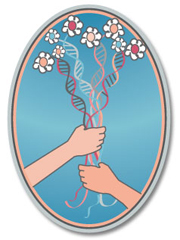Donor Sibling Registry
 |
|
| 501(c)(3) nonprofit | |
| Industry | Charity |
| Founded | September 2000 |
| Headquarters | Nederland, Colorado, USA |
|
Key people
|
Wendy Kramer, Director & Co-founder Ryan Kramer, Co-founder |
| Revenue |
|
The Donor Sibling Registry is a website and non-profit US organization serving donor offspring, sperm donors, egg donors and other donor conceived people. It was founded in September 2000 by a mother and son team, Wendy Kramer and Ryan Kramer of Nederland, Colorado. As of March 2016 2015, the site is home to more than 49,500 members including sperm/egg donors, recipient parents and donor conceived people.
The "DSR" was developed as a means of connecting people born through donor insemination. It is based on the idea that when a child is born through donor insemination, they are given a "donor number" corresponding to the person they anonymously received a sperm or egg donation from. Because a donor can donate multiple times, often two or more children are created from the same donor. When multiple user sign up with the same donor, a "match" is created. Most commonly, matches are made between half-siblings of sperm donation, however there are numerous cases of donor-offspring matches as well.
The DSR began as a Yahoo! group, which was created in September 2000. It was started by Wendy Kramer and her then 10-year-old son Ryan Kramer as a means of communicating with other offspring of artificial insemination. After the first year, the group was home to only 37 members. In October, 2002, Wendy created a press release which was sent to local news agencies. The story was picked up by Denver's NBC affiliate, KUSA-TV. Shortly after, a small article about the DSR was written for The Denver Post. This article led to national and international media coverage, giving the DSR enough exposure to grow its member base into the thousands. In 2003 the DSR became a 501(c)3 charity organization and moved from a Yahoo group to its own database website. With the help of continued media coverage, the DSR is home to more than 49,500 people (donors, parents and the donor conceived themselves) (as of March 2016).
...
Wikipedia
